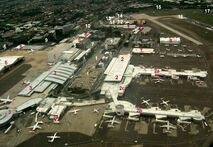=== Understanding what is a Fixed Based Operator (FBO) ===
There’s a lot of talk about FBOs, so let’s look at what they are and how they work.[]

===
What is an FBO?
An FBO, or Fixed Base Operator is an aviation company (usually a commercial entity) that provides a variety of aeronautical services to an airport, especially for private jet charters. To put it simply, it’s a private jet terminal that is located and allowed to operate within the grounds of an airport.
Evolution of FBOs
FBOs are not a modern trend, but have been around since World War I, when many parts of the country did not have airports. Transient pilots with no fixed location (“barnstormers”) would land military surplus aircraft in local fields and set up temporary camps. At the time, the aviation sector was not very heavily regulated, and pilots would offer flight lessons, rides, shows and demonstrations in exchange for money.
In 1926, with the passing of the Air Commerce Act by the U.S. government, rules and regulations were set in place for pilot licensing, training standards and aircraft maintenance. This caused pilots to look for small airports where they could go into business and establish a base for permanent operations (hence the term “Fixed Base Operator”).
FBO Services
FBOs typically provide a wide range of services, often customized based on the varied needs of business owners, luxury travel enthusiasts, private jet owners and other clients.
Some of the most important FBO services include:
• Fueling Services – Providing different kinds of aircraft fuel for various jets, as well as volume or referral discounts for frequent flyers.
• Hangar Services for Aircraft – Offering various kinds of hangars on rent, from common space to corporate hangars.
• Aircraft Rental – Helping clients locate private jets available for rent, as well as helping owners rent out their aircraft.
• Aircraft Sales – Assistance with the buying and selling of aircraft, locating buyers and sellers and negotiating the best deals for them.
• Repair & Maintenance Services and Facilities – Everything related to the upkeep of the aircraft, from minor/major repairs to long-term care and maintenance.
• Mechanical Services – Labor, supplies, parts, materials, tools and equipment, etc. for aircraft inspection, repairs, maintenance and testing.
• Baggage Handling – Smoother and more streamlined handling and transportation of baggage, from the moment that clients enter the airport.
• Conference Facilities – Setting up facilities that allow business owners and professionals to conduct their regular tasks even while traveling.
• Pilot’s Lounges – Comfortable and spacious lounge areas where private jet pilots can relax and rest before or after their flight.
• Taxi Services – Timely and efficient transportation to and from the airport, allowing for hassle-free and convenient travel.
• Parking – Separate parking areas for clients who travel to the airport in their own vehicles, or have visitors to see them off.
Current Scenario of FBOs
Earlier, the FBO industry consisted of small, independent entities spread out across major airports, but it has grown and evolved dramatically. Recent years have seen a rise in consolidated FBO companies that are constantly trying to outdo one another and gain the most private air traffic.
Today, there are over 5000 FBOs operating in the United States, many of which, like World Jet Inc., are still independently owned. With increasing competition in the private aviation sector, private jet renters and owners have started to express their own preferences and in turn reap the benefits of top-class service, convenience and comfort. ===